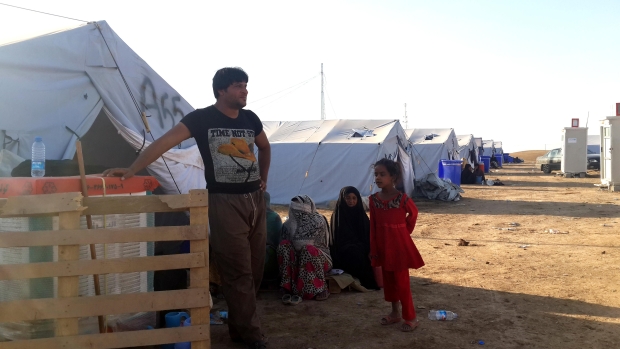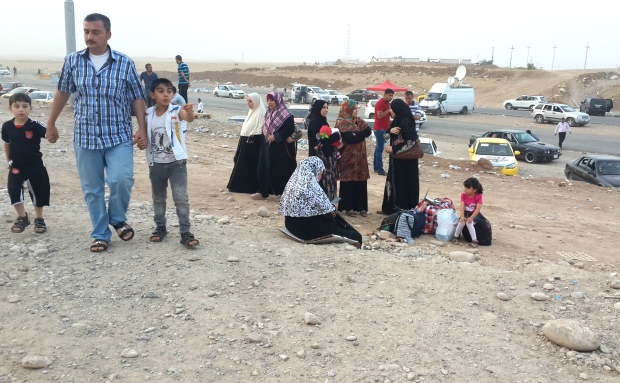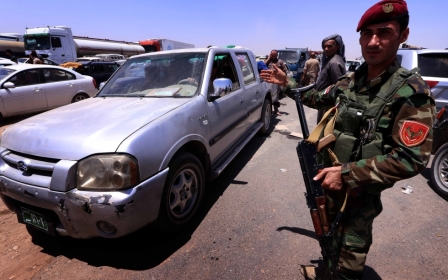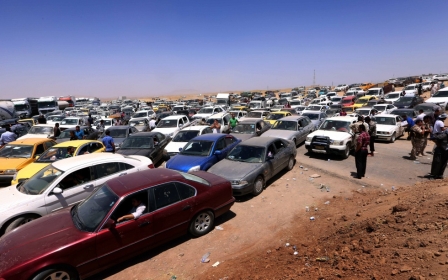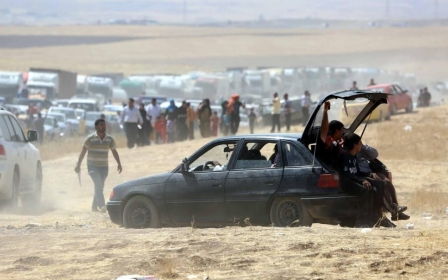Mosul's refugees face a difficult dilemma
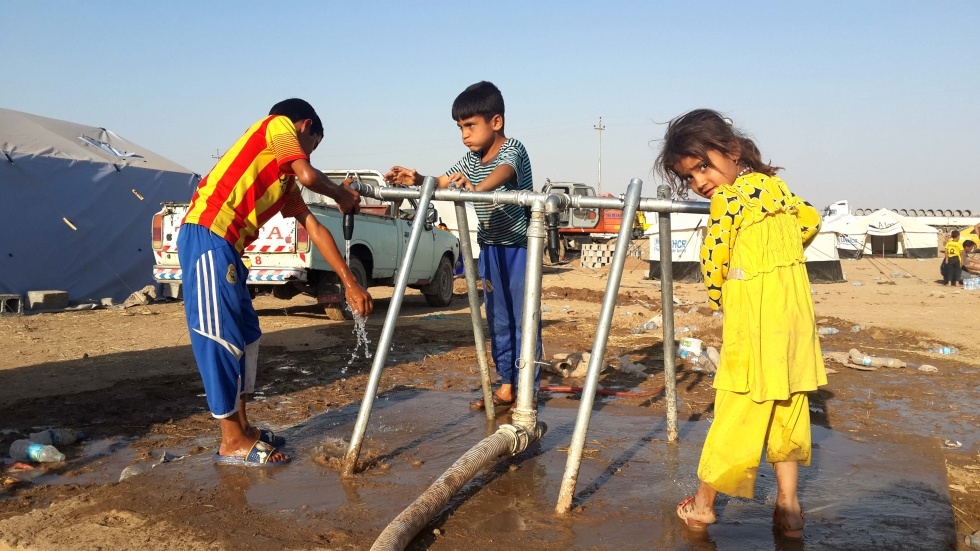
KHAZIR, Iraq - Sitting behind the steering wheel of a run-down car among a long queue of traffic waiting to be allowed through a checkpoint to enter Erbil, Iraqi Kurdistan’s capital city, 24-year-old Aydin says he cannot wait to move back to his home town Mosul.
He received permission from local authorities to enter Erbil just in case things were to go wrong in the future. But his plans are to go back to Mosul the next day anyway.
He is one of the hundreds of thousands of people who entered the considerably stable Kurdish region last week after militants from the Islamic State of Iraq and the Levant (ISIL), took over Iraq’s second largest city, Mosul, in a brazen act of defiance.
“The situation inside the city is fine,” he says, as his face and neck are covered in sweat under the sweltering early afternoon sun here. “Right now, there is no fighting. No problem.”
Contrary to what many might think, Aydin’s opinion is shared by many other internally displaced persons (IDPs) from Mosul who say the ISIL forces are not ill-treating the local population, despite growing reports of violence against Iraqi security services.
Marwan, another IDP from Mosul, left the city with his family a few days ago and fled to Duhok, some 50 kilometers north. He insists he fled because he feared that the Iraqi army would soon launch indiscriminate attacks against the Iraq's second city and not because of the ISIL-led offensive.
"It is very expensive in Duhok. It costs us $200 for one hotel room per night," Marwan, who did not want to give his last name, told the Middle East Eye by telephone.
"Everyone in Mosul is telling us that it safe there and so we will be heading back. There is no reason to leave our home empty there, open to possible theft."
In fact, many IDPs who spoke to MEE seemed broadly sympathetic toward the militants that are said to be a mix of ISIL jihadists and former loyalists of Saddam Hussein’s Ba’ath regime. This could be an apparent attempt to win the hearts and minds of the locals in order to pave the way for longer-term governance.
The primary reason many of them say they left for Kurdistan was fear of reprisals by Iraqi military forces after Mosul and a number of other areas in the Sunni Arab heartland of Nineveh, Salahaddin, Diyala and Anbar provinces were overrun by militants. Iraqi Prime Minister Nuri al-Maliki has vowed to expel the militants from areas they currently control, sparking concern that the security situation could spiral further out of control.
But as fears of attacks by ISIL militants on civilians have subsided for some, local authorities say that groups of IDPs have already started returning to Mosul. Although it is difficult to obtain any official figures supporting this claim, there are other indications that Mosul residents have rising trust in the situation back home.
While on the first and second days after Mosul fell to militants, hundreds of thousands of IDPs had gathered behind the entrances to Kurdish cities, now no more than a few dozen people can be seen at any given time.
Humanitarian responsibility
Dindar Zebari, deputy head of the Kurdistan Regional Government’s (KRG) foreign relations department, says that while there is no thorough survey, as many as 300,000 might have sought refuge in the Kurdish region, figures that have been backed up by UN and other aid agencies.
“It’s certainly a source of concern,” said Zebari, adding that the KRG’s resources are highly stretched coping with the large influx of IDPs. “It’s a humanitarian responsibility and the KRG is committed to international agreements in that regard.”
The KRG has already opened its borders to more than 200,000 Syrian refugees and tens of thousands of IDPs from other parts of Iraq, Iran and Turkey. As a result, the government has been overwhelmed and is finding it difficult to meet refugees’ needs. Even before the massive influx of refugees in recent years, the KRG was struggling hard to serve its own citizens and develop the infrastructure of a region destroyed by years of war and sanctions.
The Kurdish government is also concerned about the impact on security that the large influx of refugees might have. ISIL claimed responsibility for an attack on Erbil’s security headquarters last September that killed around six people and injured dozens and with the authorities already stretched, there are concerns that the autonomous Kurdish region may be more vulnerable to attacks.
Kurdish military forces known as Peshmerga have clashed with ISIL and other militant groups in the past few days. The Peshmerga are largely seen as the bulwark against ISIL’s advances in northern Iraq.
Checkpoints are tightened up to prevent any infiltration by militants who might try to exploit the situation.
Rizgar Mustafa, the mayor of the nearby town of Khabat, says around 110,000 IDPs have entered Erbil province.
He says security officers record fingerprints, pictures and personal information of the IDPs entering Kurdistan from Mosul these days.
Security forces give “permits” to the IDPs moving here. Those the Middle East Eye spoke to said they were granted permits without problem, although there have been widespread reports of many IDPs being denied entry and turning back.
The authorities have set up camps in Erbil and Duhok provinces to the east and north of Mosul city, with international aid agencies gradually establishing refugee camps, but the vast majority of those fleeing have headed to the main cities and surrounding towns. However, with hotels overwhelmed and the financial reserves of IDPs fast running out, many know that they will soon face a choice of returning home or making their way to one of the many camps.
Camp life
Khazir camp is located halfway between Erbil and Mosul and spread across a huge plain. Men and women chat outside the tents, and children play on the dusty field. The number of residents in the camp is steadily rising, and according to air workers there, currently there are around 800 people living in the camp.
Abu Hassan, 38, and his family of five, are sitting in front of their tent sharing a light moment with residents of a neighbouring tent. His children’s clothes are covered with dust as they run around.
Most camp residents here are those who cannot afford to pay for rent inside the towns or do not have relatives there.
The cost of living in KRG-controlled areas is quite high. Renting a small house in Erbil city can cost up to almost $400. And this is well beyond the means of low-income families like Abu Hassan’s.
He says they have received enough food, but complains that health and sanitation services are not sufficient.
“There is no ambulance if someone falls sick and needs to go to the city,” he adds. “We need more medical care.”
Metres away, Norwegian Refugee Council (NRC), an international organisation helping refugees around the world, is installing makeshift bathrooms. Bulldozers are digging the ground, creating even more dust and haze.
The United Nations Refugee Agency, UNHCR, has provided tents for the families. And the KRG and a number of international organisations are providing basic services such as food, water, electricity and security. Locals have also donated food to the IDPs here but refugees still feel more should be done.
Abu Sami, 33, moved here on Saturday with his family of five. As he washed his face using a public water tank, he expressed frustration with the situation in his city and the country at large.
“People are helpless back in Mosul,” he says. “There is no protection. People fear for their lives, their children and their loved ones.”
Although some may feel that the situation in Mosul is fine for the time being, it’s uncertainty over what might happen in the coming days and weeks that is dissuading many from going back home, even if a trickle has begun to head back.
New MEE newsletter: Jerusalem Dispatch
Sign up to get the latest insights and analysis on Israel-Palestine, alongside Turkey Unpacked and other MEE newsletters
Middle East Eye delivers independent and unrivalled coverage and analysis of the Middle East, North Africa and beyond. To learn more about republishing this content and the associated fees, please fill out this form. More about MEE can be found here.


